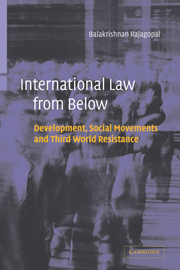Book contents
- Frontmatter
- Contents
- Abbreviations
- Preface and Acknowledgments
- Introduction
- PART I International law, development, and Third World resistance
- PART II International law, Third World resistance, and the institutionalization of development: the invention of the apparatus
- PART III Decolonizing resistance: human rights and the challenge of social movements
- PART IV Epilogue
- References
- Index
Preface and Acknowledgments
Published online by Cambridge University Press: 09 July 2009
- Frontmatter
- Contents
- Abbreviations
- Preface and Acknowledgments
- Introduction
- PART I International law, development, and Third World resistance
- PART II International law, Third World resistance, and the institutionalization of development: the invention of the apparatus
- PART III Decolonizing resistance: human rights and the challenge of social movements
- PART IV Epilogue
- References
- Index
Summary
The role of non-state actors, particularly NGOs and social movements, has become more important in international relations and in domestic policy. The well-known protests against the World Trade Organization in Seattle in 1999 and against other global economic institutions since then have firmly introduced social movements into the debate on global governance. The violent attacks against targets in the US on September 11, 2001, have even introduced the idea of networks of non-state actors into analyses of peace and security. Indeed, recent work in several disciplines including international relations, comparative politics, sociology and anthropology has attempted to come to grips with these new phenomena. Despite this, legal scholarship in general, and international legal scholarship in particular, have been slow to respond to these changes. Despite recent work in law and society that examines the importance of social mobilization for legal transformation, international legal scholarship has remained largely isolated from this body of work. A principal purpose of this book is to fill this gap by systematically addressing the role of social movements in international legal transformation.
However, this is a hard task. There are two ways of seeing and interpreting international legal transformation – from above as most lawyers do when they focus on formal sources, judicial opinions, and treaties exclusively – or from below when we focus on the lived experience of ordinary people with international law when they encounter international institutions, frame their demands in international legal terms, and network for influencing international or domestic policy.
- Type
- Chapter
- Information
- International Law from BelowDevelopment, Social Movements and Third World Resistance, pp. xiii - xviPublisher: Cambridge University PressPrint publication year: 2003

